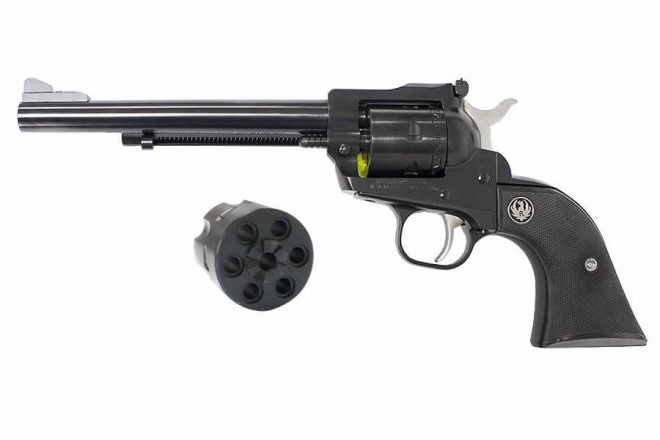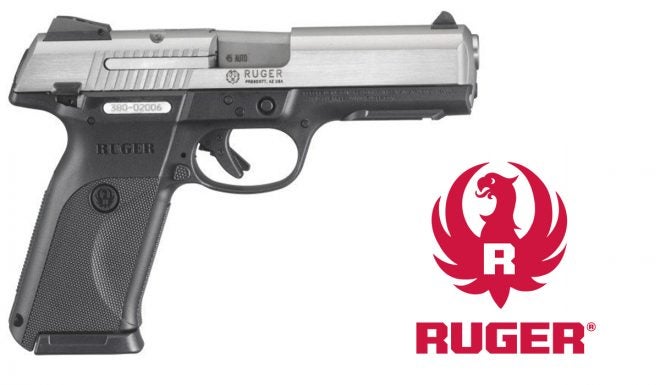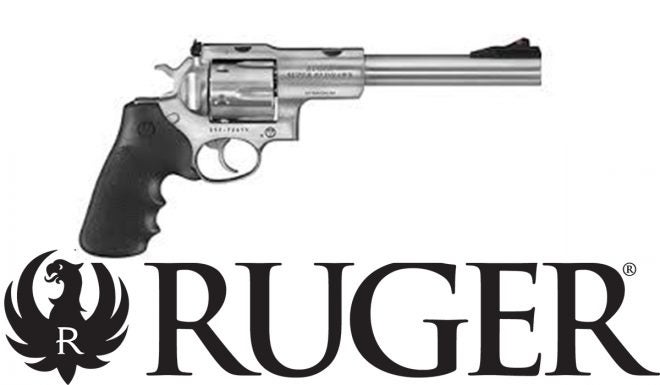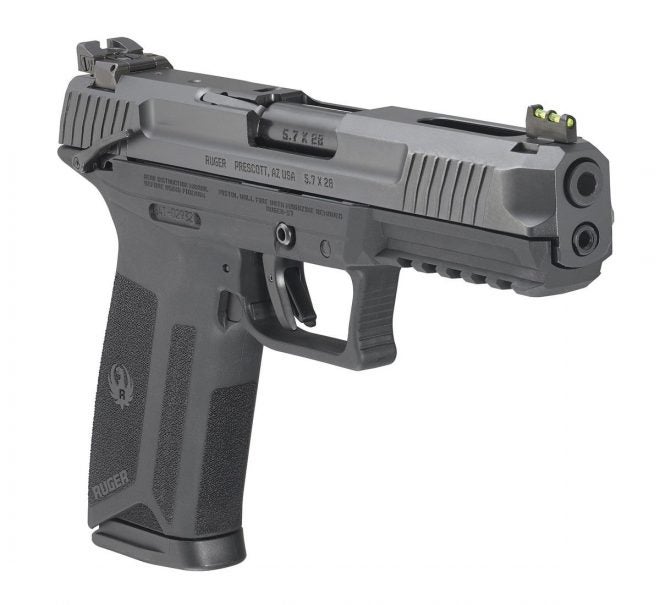Five Ruger Handguns that Changed the World
Derrek Sigler 08.27.20

There are many iconic companies out there that have a loyal following. Just ask anyone on social media which truck is the best, and a war of words will ensue. Handgun manufacturers have a strong following with gun owners, too, although we tend to be a little more civil with each other. One of the best known handgun manufacturers in the industry is Ruger. Over the years, Ruger has developed and sold several handguns that have made a huge impact on the gun world. Some of these iconic firearms have a design that sets them apart from everything else on the market. Others have made a mark in history with how they were marketed. Here are five Ruger handguns that have changed the world.
The Ruger Standard
Every company has to start somewhere, and with Ruger, those beginning came with the Standard, a .22-caliber semi-automatic pistol that incorporated design elements from the German Luger, the popular Colt Woodsman and Japanese Nambu pistols that Bill Ruger was fond of. The first prototypes were crude, but the idea was strong enough to get the company rolling and Ruger developed a manufacturing process and design that allowed the Standard to be produced at a much lower cost than the competition. The initial price for the Standard when released in 1949 was just $37.50. Orders for the Standard rolled in, but Ruger would not cash a check until the pistol was produced. This did two things for Ruger. It set the company up for good financial strength in the future, but also set the stage for a reputation that took many years to shed – Ruger had a habit of unveiling firearms and taking orders when there was no production of the firearm. It came to be known that if you heard of a new Ruger, it would be months before you could actually get one for yourself.
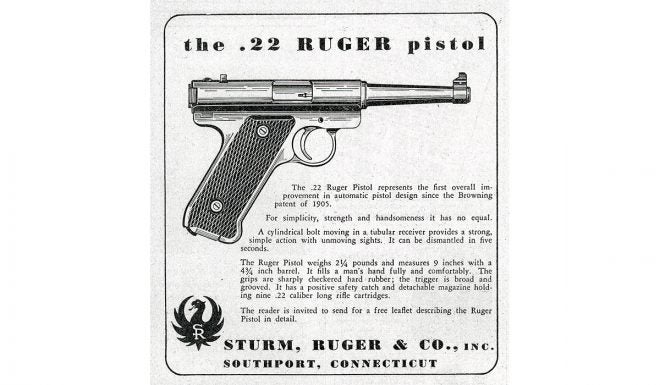
The Ruger Standard was sold for decades and many owners cherish it. These magazine-fed .22 pistols evolved into the MK II, MK III and the latest version, the Ruger MK IV. The pistol is fun to shoot, cheap to own and it has a reputation for accuracy. Other companies have tried to capture the same fire with their own rimfire pistols, but this is a category that Ruger remains king in.
Ruger Single Six
In the 1940s and 50s, westerns were the most popular films and TV shows. People wanted single-action revolvers like the ones the gunslingers on TV used, but manufacturers like Colt had discontinued producing most of them in favor of newer designs. In 1953, Ruger jumped into the single-action business with, as you would expect from Ruger, a .22 rimfire – the Single Six. The Single Six got its name by being a single-action, six-shot revolver that looked just like the sidearms of the old west, but chambered in the cheap and fun to shoot .22. The model was an immediate success and led Ruger to develop other firearms in the single-action realm.
The original Single Six was made from 1953 to 1973. In 1973, the design was changed to add a transfer bar mechanism that added safety for those carrying the revolver with all six cylinders loaded. The original design let the hammer rest on a loaded chamber. The models after 1973 were called New Model Single Six. There are variations of the New Model Single Six, including the popular convertible model that comes with two cylinders, a .22LR and a .22 Magnum, that can be swapped out quickly. The model line grew to include the Single 10, a ten-shot .22LR, the Single 9 in .22 Magnum and a .32 caliber that has evolved into the .327 Federal caliber. Who has a Single Six?
Ruger SR9
There will be gun guys out there who ask, why include the SR9 in this list? I have my reasons, for sure. Let’s start with the Beretta 92, the pistol that has been the standard-issue firearm of the U.S. Military. It became well known in the firearms world that the military was looking at replacing the 92, and that a polymer-framed pistol was considered ideal due to the popularity and reliability of the Glocks. It seemed that every gun company was quick to develop a high-capacity, polymer-framed 9mm to compete for the chance at the lucrative contract. Ruger had reliable 9mm pistols in the lineup, but the frames were metal. Would they enter into the “Tactical Tupperware” arena? The answer is yes, but that is not why the SR9 makes this list.
I was working with Gun Digest when we got a call that we all needed to sign a non-disclosure agreement that was strict enough, we had to have the legal department look them over. Once things were all signed and notarized, a box showed up with instructions that no one was to see what was inside except those of us who had signed off. What we had was a non-firing model of the SR9. Why was Ruger being so secretive? Yes, they were getting into the polymer-framed market, but that wasn’t it. Ruger was breaking a tradition the company started out with. No one, and I mean no one, was going to see anything about a new pistol until it was ready to ship to dealers. There would be no lag time from when people saw it for the first time, to when they could pick it up and buy it. It pushed other companies to follow suit, which was a major development for firearms. The SR-series has evolved into the American line although the SR22 is available, along with the SR1911, but that is a different animal altogether.
Ruger Super Redhawk
The Super Redhawk is a large-caliber, double-action revolver from Ruger developed to handle the pressures of big calibers and has a larger frame designed to accept a scope for hunting. Ruger even includes the rings with the handgun. Originally released in 1987, the Super Redhawk was chambered in .44 Mag and did well against the competition from Smith & Wesson for a large-caliber hunting revolver. In 1997, Ruger added the most powerful cartridge in handguns at the time, the .454 Casull. Where Ruger diverted from the norm with the Redhawk is that they offered the .454 in a six-shot version, while all of the competition only offered their revolvers with a five-shot cylinder due to the high pressures of the round.
The Ruger Super Redhawk led to another first for the company – the first cartridge to carry the Ruger name. In 2003, Ruger and Hornady teamed up to develop the .480 Ruger. The .480 is built on the same frame as the .454 Casull, but the pressures are lower. The .480 uses a .475-bore bullet, but the lower pressures make it easier to shoot than the Casull, and easier to chamber in a six-shot revolver. It’s very close to the .475 Linebaugh, and you can fire the .480 in a revolver chambered for the Linebaugh super magnum. The lower pressures of the .480 made it a great hunting round, which is exactly what Ruger wanted. It doesn’t have the kick of the .454 or .475. Hand loaders started reloading the .480 a little too hot, which caused a brief break in production of the Super Redhawk in the caliber until Ruger could insure the sidewalls could handle the pressures.
Ruger-57
At this past SHOT Show, anybody who went to the Ruger booth was there to see one handgun in particular, the Ruger-57.
And while there are other Ruger handguns that could easily make this list (trust me – I know!), the 57 makes it because of the buzz around it. Everyone has been asking us if we got the chance to shoot it. It’s very cool and fun. Another reason to include it here has to do with how Ruger does things. Again going back to my Gun Digest days, we got a couple of FN Five-seveN pistols and cases of ammo to test. The caliber is FN’s 5.7x28mm FN, and is a high-power, smaller caliber round with excellent velocity and carrying capacity. Both the FN and Ruger-57 can hold 20 rounds in the magazine. The FN pistol and caliber were developed as a replacement to the 9mm for NATO usage, although production was halted due to political reasons in Europe. It is now used by police agencies and is the standard-issue pistol for the U.S. Secret Service. My own experience with the FN is that it’s accurate and stupid-fun to shoot. The only reason I don’t own one is cost.
Enter the new Ruger pistol.
Ruger enters the 5.7x28mm market with a pistol that is more than $300 cheaper than the FN, and Ruger has a wider distribution network. Ammunition is now becoming more widely accessible, too, with new offerings coming often. If what we’re hearing from retails is true, the Ruger-57 is being well-received and rumors are that other companies will soon join the market. Will the 5.7x28mm be a long-lasting pistol caliber? What do you think?
